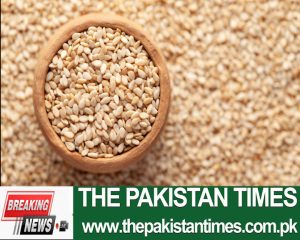
China will increase investment in the sesame growing project under the Pak-China contract and plans to import at least 5,000 tons of sesame from Pakistan this year. “In 2023, we imported 400 tons of sesame from Pakistan to China and this year we expect to import at least 5,000 tons of sesame.
At the end of 2023, the project’s first batch of sesame was exported to China, signaling a promising year for sesame exports. Sesame, a traditional crop in Pakistan, is facing challenges such as low market demand and limited cultivation scale. Realizing the growing demand for sesame in China, the Sino-Pak Agricultural Exchange and Cooperation Center, led by China Machinery Engineering Corporation (CMEC), collaborated with Pakistani farmers to establish Set up contract farming initiatives. China sesame import volume has remained stable at around 1 million tons over the past three years. Pakistani sesame has the advantage of being one of the first countries to enter the Northern Hemisphere market each year, and its proximity to China ensures short shipping times of only 10 to 15 days by sea. The project begins in 2022. After two years of testing, the center has made significant progress in seed selection and industrial modeling.
In 2023, the cultivation area exceeded 600 acres, showing promising sesame production potential. When I researched Pakistan in 2018, the area under sesame cultivation was only 200,000 acres. By 2023, the area will increase to 1 million acres. Highlighting the impressive growth of sesame farming in Pakistan. We also provide support in terms of farming resources and technical training to local farmers, and their yield per acre has nearly doubled compared to 2018.
To further improve production efficiency sesame, the center plans to introduce advanced sesame harvesting machines and sorting equipment from China. We are currently looking to cooperate with agricultural machinery companies and plan to introduce combined harvesting and seeding machines, as well as aerial-assisted pesticide spraying to support agricultural management in Pakistan.
Sub Editor: Arslan